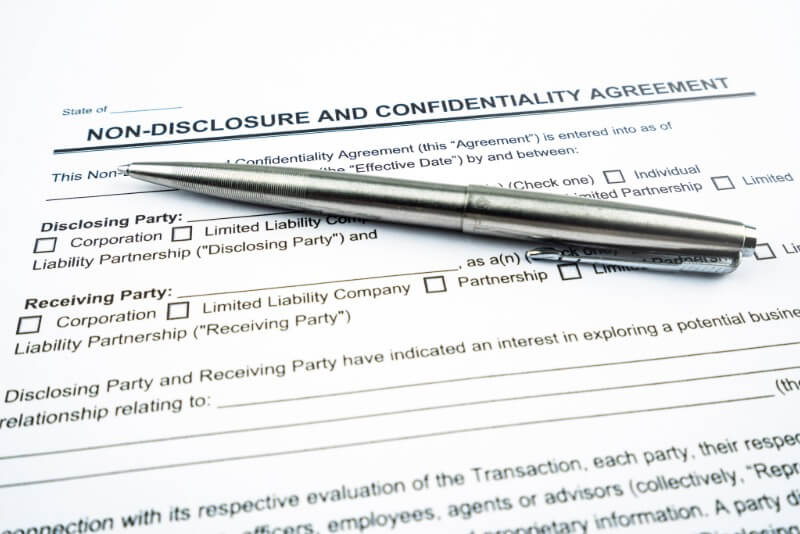
Non-disclosure agreements (NDAs) have earned a controversial reputation in recent years, but they are a valuable tool to protect confidential business information.
At its core, an NDA is a contract requiring a person not to disclose confidential information. NDAs allow businesses to hire talented employees and build interest in their operations without risking financial harm.
If you need help drafting or reviewing a Texas Non-Disclosure Agreement, Massingill can help. Without the assistance of an experienced lawyer, you may discover your NDA is practically or legally unenforceable.
Let us guide you through drafting and negotiating an NDA and help ensure your NDA covers what you need to be covered. Take the first step in safeguarding your business secrets – contact Massingill today!
What Is a Non-Disclosure Agreement?
A non-disclosure agreement is a legally binding contract. Under the agreement, one or more parties allow another person to access confidential information on the condition that they not disclose it.
What Are the Types of NDAs?
There are three basic types of NDAs:
- Unilateral,
- Bilateral, and
- Multilateral.
Unilateral and bilateral NDAs are more common, while multilateral NDAs involve multiple parties.
Unilateral NDAs
A unilateral NDA is a contract where only one party offers confidential information while the other agrees not to disclose it.
Often, the party with the confidential information is a business and the other party is an individual.
Bilateral NDAs
Bilateral NDAs involve two parties having confidential information the other needs access to.
In bilateral NDAs, both parties agree not to disclose each other’s information, creating an exchange of value.
Multilateral NDAs
Multilateral NDAs are used when several parties with confidential information want to protect their information.
Multilateral NDAs may involve parties that all have information to protect or a mixture of parties with confidential information and parties without it.
How Long Do NDAs Last?
An NDA can last as long as the parties who sign it agree to make it last. Some NDAs may only last a year or less when information must stay confidential during a negotiation. Other NDAs may have no expiration date, lasting for the foreseeable future.
The ability to set or not set an expiration date is another advantage of creating an NDA instead of relying on the law to protect you. What works for you and the other signers can be enshrined to leave no questions about every party’s contractual obligations.
What Makes an NDA Enforceable or Unenforceable?
Like any contract, an NDA can be found unenforceable under the law. Drafting an NDA requires you to strike a careful balance in what is covered to ensure your contract will be upheld.
Enforceable NDAs
An enforceable NDA should provide specifics, including:
- The information to be kept confidential;
- The length of time the agreement will last;
- The applicable geographical location or locations; and
- Violating the NDA.
Your NDA should also be fundamentally fair or at least reasonable to the parties involved.
Unenforceable NDAs
After someone signs an NDA, you may think the issue is resolved. However, if you do not carefully draft and review your NDA, a shrewd lawyer may be able to find reasons to invalidate the contract.
An NDA may be invalid, including when it:
- Is too broad in scope;
- Contains material errors;
- Involves information that the public has a significant interest in knowing;
- Is unreasonable or overly demanding; or
- Covers non-confidential information.
Knowing how to avoid these issues can be extremely challenging without a legal background and experience with NDAs.
The law invalidating NDAs is evolving, so it helps to have an experienced attorney who can help you avoid wading into murky waters with your NDA.
For example, NDAs have been the subject of controversy in recent years after being used in high-profile sexual harassment and assault lawsuits.
Some people believe using NDAs to keep the details of those lawsuits private hides important information from the public.
Why Use A Non-Disclosure Agreement?
Since trade secrets and other confidential information are protected under Texas law, what is an NDA used for?
Protection
NDAs are frequently an effective way to use the force of law to protect vital business interests.
Having assurance that parties you allow to access your confidential information will not disclose it offers many benefits, such as:
- Promoting collaboration,
- Permitting knowledgeable negotiation,
- Selling goods and services,
- Refining practices and techniques involved in business operations, and
- Bringing in top talent without risking creating formidable competitors.
Ultimately, NDAs can provide a protective measure allowing those holding the information to be comfortable revealing it to others.
Customization
As legally enforceable contracts, you can set the terms of the NDA. The ability to customize your NDA provides many benefits, like:
- Placing signers on notice of what you consider most important not to disclose;
- Establishing specific penalties for violating the NDA;
- Determining in advance how to handle disputes that arise under the NDA; and
- Emphasizing the seriousness of not disclosing the information.
You may have some legal remedies without an NDA if someone takes your confidential information, but an NDA allows you to customize your options.
Enforcement
An NDA will typically include details covering how it can be enforced. You may include provisions covering:
- The venue for disputes;
- Legal remedies when a party violates the NDA;
- Penalties for violations
- Dispute resolution options;
- Who can enforce the NDA; and
- How to enforce the NDA.
One common legal remedy is to require the violator to stop sharing the information through an injunction.
You may also include a reasonable monetary penalty and a requirement that the violator cover damages incurred from the violation.
Let Massingill Help
If you need help drafting or reviewing a Texas non-disclosure agreement, contact Massingill to speak with an experienced NDA lawyer.
Many businesses rely on NDAs, and it is essential to ensure those NDAs are fair in the circumstances and enforceable when push comes to shove.

